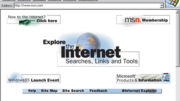This morning I was poking around my computer’s list of installed apps and I came across this entry:

Now first of all, I think this sounds like some sort of spyware. It sounds like a confusing obfuscation of made up words that is just designed to make me think it’s important. I don’t remember installing anything by this name and so I began to get worried. I investigated, and once I figured out what was going on, I thought it would be a good subject for an article.
Answer: It’s Java.
You might remember Java. It was one of the first add-on languages for the web. Back in the early days, HTML was pretty boring. In order to give people the ability to interact with web pages in fun and interesting way, addons like Flash and Java were invented. These formed the basis of the internet as we see and know it today. Without those first steps, there would be no streaming video, no online gaming, nothing but text-based pages.
However, as the 20th century ticked over into the 21st, it became obvious that these tools were never designed to be secure. They were always designed to be as open as possible and that meant it was easy to exploit them. For most of the first decade of the 21st century, the owners of Flash’s and Java’s code bases furiously worked to update them. Eventually by the mid-2010s it became obvious that it was never going to be possible for these systems to be secure. In 2016, the developers of Java permanently severed it from the browser. Flash followed in 2020.
Java lives on
The thing is, Java and Flash could be used to create offline applications as well. These applications were more secure, not being tied directly to the browser. At one time an astounding number of apps ran on Java or Flash for the desktop. That number continues to dwindle, but there are still some. Ubiquiti’s Unifi app is one of them, and that line of access points continues to be popular at Solid Signal.
Sun, the developer of Java, told the world in the 2010s that they didn’t want to be in the Java business any longer. They published all the source code for Java and encouraged other companies to build on their “success” as a developer. One of those companies was a group called “Adoptium,” which was formed to keep the Java Runtime Environment updated and secure. Adoptium has some heavy hitters like IBM, Microsoft, and Google, ensuring that its products would have wide acceptance.
Enter “Eclipse Temurin”
The libraries that used to be called “Java” were developed by Adoptium into a product called “Eclipse Temurin.” As far as I can tell, the purpose of Eclipse is to allow for older Java-based apps to continue to run securely. It doesn’t look like they are interested in really moving Java forward. They just want to make sure that one obsolete app doesn’t kill the whole internet.
Adoptium’s product, Eclipse Temurin, is a replacement for what used to be called the “Java Runtime Environment.” That is, the version of Java that runs on desktops and is not connected natively to the internet. “Temurin,” despite having a vaguely Asian sound, is just an anagram of the word “Runtime.” This appears to be a case of developers being a little too clever for their own good.
Bottom line: don’t worry about it
Eclipse Temurin will be installed instead of Java on any older app you have that needs it. It seems to be completely secure and doesn’t affect the way your computer runs if it’s not needed. Most likely, you probably won’t even need it on your next computer.
If only everything you see installed on your computer was so benign.





